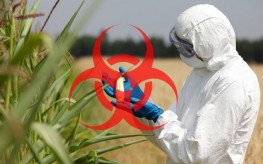Meta-Analyses Finds Link Between Glyphosate and Cancer of the Lymph Tissue
Meta-Analyses Finds Link Between Glyphosate and Cancer of the Lymph Tissue
Given the extent of published research pieces finding a positive relationship between glyphosate (the active ingredient in Monsanto’s best-selling herbicide RoundUp) and cancer, it isn’t very jaw-dropping anymore to hear of a new study coming to similar conclusions.

The review focused on 30 years-worth of epidemiologicresearch on the connection between NHL and exposure to ingredients used in agricultural pesticides. The researchers examined the results from 44 papers, which found an association between NHL and 21 pesticide chemical groups and 80 active ingredients. The meta-analyses showed that phenoxy herbicides, carbamate insecticides, organophosphorus insecticides and the active ingredient lindane, an organochlorine insecticide, were positively associated with NHL.
In a handful of papers, associations between pesticides and NHL subtypes were reported; B cell lymphoma was positively associated with phenoxy herbicides and the organophosphorus herbicide glyphosate.
Diffuse large B-cell lymphoma was positively associated with phenoxy herbicide exposure. Despite compelling evidence that NHL is associated with certain chemicals, this review indicates the need for investigations of a larger variety of pesticides in more geographic areas, especially in low- and middle-income countries, which, despite producing a large portion of the world’s agriculture, were missing in the literature that were reviewed.”
But of course this isn’t the only study to find a connection between pesticides, glyphosate, and cancer. One groundbreaking study has foundthat glyphosate is responsible for fueling breast cancer by increasing the number of breast cancer cells through cell growth and cell division. The effects are so potent, in fact, that the cancer cell proliferation is driven even when we’re talking about RoundUp in the parts-per-trillion (PPT) range.
These are just a few of the countless studies revealing the many dangers of RoundUp, pesticides, and glyphosate. It is these findings that are causing nations around the world to limit pesticide use, or ban the ingredients altogether. Sri Lanka became the first countryto ban Monsanto’s toxic RoundUp Ready chemical, glyphosate, in light of recent studieslinking it to chronic kidney failure, while a full suspension of glyphosateis being demanded by the Brazilian Federal Public Prosecutor in the Federal District. What’s more, the Netherlands have passed a similar ban to Russia, Tasmania, and Mexico, disallowing the used of glyphosate-laced herbicides by the general public.
It is time the United States makes a move of it’s own. Just how many studies need to reveal glyphosate’s dangers before we ignite a ban of our own?
| About Mike Barrett: | |
| Mike is the co-founder, editor, and researcher behind Natural Society. Studying the work of top natural health activists, and writing special reports for top 10 alternative health websites, Mike has written hundreds of articles and pages on how to obtain optimum wellness through natural health. | |
Other Popular Stories:
Get The NaturalSociety Natural Health Newsletter!
Post a Comment